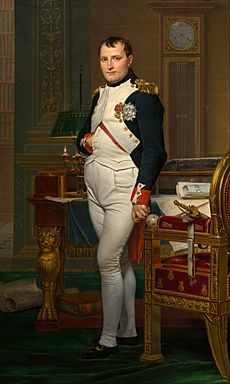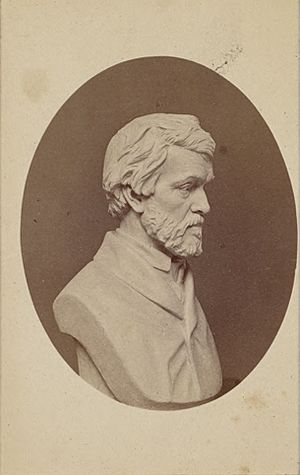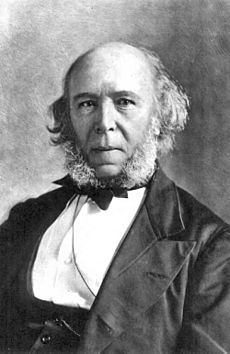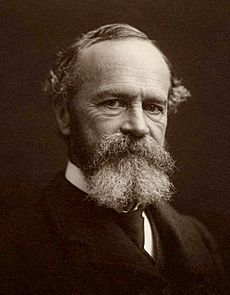Great man theory facts for kids

The great man theory is an idea from the 1800s. It suggests that history is mostly shaped by "great men" or heroes. These are special people with amazing qualities. They might have superior intelligence, great courage, or incredible leadership skills. Sometimes, people even believed they had divine inspiration. Because of these traits, these individuals had a huge impact on history.
This idea is mostly linked to Thomas Carlyle, a Scottish writer. In 1840, he gave talks about heroism. He later published them in a book called On Heroes, Hero-Worship, & the Heroic in History. Carlyle believed that:
Universal History, the history of what man has accomplished in this world, is at bottom the History of the Great Men who have worked here. They were the leaders of men, these great ones; the modellers, patterns, and in a wide sense creators, of whatsoever the general mass of men contrived to do or to attain; all things that we see standing accomplished in the world are properly the outer material result, the practical realisation and embodiment, of Thoughts that dwelt in the Great Men sent into the world: the soul of the whole world's history, it may justly be considered, were the history of these.
This theory is often compared to "history from below." That idea focuses on how ordinary people and everyday events shape history. Another different idea is historical materialism. This looks at how social and economic factors drive history.
Contents
What is the Great Man Theory?

Thomas Carlyle believed that "The History of the world is but the Biography of great men." He thought heroes changed history. This happened through their personal qualities and sometimes, divine inspiration. In his book Heroes and Hero-Worship, Carlyle looked at six types of heroes:
- The hero as a god (like Odin)
- The hero as a prophet (like Muhammad)
- The hero as a poet (like Shakespeare)
- The hero as a priest (like Martin Luther)
- The hero as a writer (like Rousseau)
- The hero as a king (like Napoleon)
Carlyle also said that studying great men was helpful. He thought it could help people find their own heroic qualities.
Sidney Hook, an American scholar, explained a common misunderstanding. People sometimes think the theory means only great men matter. But Carlyle meant that great men are the *decisive* factor. This is because of their unique genius. Hook gave examples: "How many battalions are the equivalent of a Napoleon? How many minor poets will give us a Shakespeare? How many run of the mine scientists will do the work of an Einstein?" This shows that unique genius is not just a sum of many talents.
Frederick Adams Woods, another American scholar, supported this theory. He studied 386 rulers in Western Europe. He looked at their influence from the 1100s to the late 1700s.
The great man approach was very popular with historians in the 1800s. For example, the 1911 Encyclopædia Britannica Eleventh Edition had many detailed biographies of great men. It had fewer general or social history articles. Some philosophers also strongly supported this view. These included Léon Bloy, Kierkegaard, Oswald Spengler, and Max Weber.
Georg Wilhelm Friedrich Hegel thought that "World-Historical individuals" were agents of a "World-Spirit." He believed a great man didn't create history himself. Instead, he simply revealed what was already meant to happen.
In Untimely Meditations, Friedrich Nietzsche wrote that "the goal of humanity lies in its highest specimens." But Nietzsche later rejected Carlyle's idea of hero worship.
Core Ideas of the Theory
The great man theory has two main ideas:
- Every great leader is born with special traits. These traits help them lead naturally.
- These traits appear when there is a great need for them. This allows the person to step up and lead.
This theory suggests that these leaders are heroes. They can overcome challenges and inspire others. It relies heavily on the idea that leaders are "born" with their abilities, not "made" through learning. This view suggests that those in power deserve to lead. It implies they shouldn't be questioned because they have unique traits for their position.
Different Views on the Theory

Herbert Spencer's Criticism
Herbert Spencer was a strong critic of Carlyle's theory. He thought it was unscientific to say that individuals alone caused historical events. Spencer believed that "great men" were actually products of their society. He wrote:
You must admit that the genesis of a great man depends on the long series of complex influences which has produced the race in which he appears, and the social state into which that race has slowly grown. ... Before he can remake his society, his society must make him.
Spencer argued that society shapes the great man first. Only then can the great man shape society.
William James's Defense

William James, a philosopher and psychologist, defended Carlyle. In 1880, he gave a lecture called "Great Men, Great Thoughts, and the Environment." He strongly disagreed with Spencer. James argued that:
If anything is humanly certain it is that the great man's society, properly so called, does not make him before he can remake it ... The mutations of societies, then, from generation to generation, are in the main due directly or indirectly to the acts or the examples of individuals whose genius was so adapted to the receptivities of the moment, or whose accidental position of authority was so critical that they became ferments, initiators of movements, setters of precedent or fashion, centers of corruption, or destroyers of other persons, whose gifts, had they had free play, would have led society in another direction.
James believed that a great man's unique qualities come from within. They are not just products of their environment. He said these unique individuals then change their environment. This change wouldn't happen without them. The success of these changes also depends on how society accepts them.
James used an example from biology. He said that tiny differences in a developing egg can lead to a genius or an ordinary person. He argued that these "genetic anomalies" in the brains of great men are key. They introduce new ideas, discoveries, and perspectives. These ideas "flash out of one brain, and no other."
James then explained that these unique individuals, or "great men," influence their environment. Society then either accepts or rejects these new ideas. If accepted, the environment changes. This change then affects how future geniuses are selected.
The products of the mind with the determined æsthetic bent please or displease the community. We adopt Wordsworth, and grow unsentimental and serene. We are fascinated by Schopenhauer, and learn from him the true luxury of woe. The adopted bent becomes a ferment in the community, and alters its tone. The alteration may be a benefit or a misfortune, for it is (pace Mr. Allen) a differentiation from within, which has to run the gauntlet of the larger environment's selective power.
James concluded that two factors cause social change:
- The unique individual, who starts new ideas.
- The social environment, which accepts or rejects these ideas.
He stated: "Both factors are essential to change. The community stagnates without the impulse of the individual. The impulse dies away without the sympathy of the community."
James also argued that history is not just a set of fixed "laws." He said that if a genius shows the way, society will often follow. He gave the example of Italy and Germany becoming unified. This happened because specific leaders like Napoleon III, Bismarck, and Cavour were in positions of power at the right time.
Other Perspectives
Before the 1800s, Blaise Pascal wrote about the idea of "greatness." He suggested that the importance of "great men" was often due to custom and chance. For example, being born into a noble family in the right place.
Leo Tolstoy's novel War and Peace also criticizes the great man theory. Tolstoy believed that the importance of great individuals is imaginary. He saw them as "history's slaves," simply carrying out what was meant to be.
Jacob Burckhardt believed that great men existed in politics. He thought that ignoring great men would lead to lower standards in society.
Mark Twain suggested that most people are "morally cowardly." He believed that revolts against injustice are started by "the one daring man in the 10,000." Others then slowly join in.
In 1926, William Fielding Ogburn noted that the great man theory was being challenged. Newer ideas focused on wider social forces. He believed that great men were products of productive cultures. For example, he thought that if Isaac Newton hadn't discovered calculus, Gottfried Leibniz would have. And if neither had, someone else would have.
Among modern thinkers, Sidney Hook supports the idea of heroes. His book The Hero in History looks at the role of outstanding people in history.
David R. Sorensen noted that support for Carlyle's theory has declined. However, Robert K. Faulkner still argues for the importance of "greatness." He criticizes modern views that are against superior leaders and human excellence.
Ian Kershaw wrote about Hitler. He noted that Hitler's personal qualities were not noble. Kershaw rejects the great man theory. He argues it's more important to study wider social and political factors to understand Nazi Germany. Kershaw believed Hitler was an ordinary person. His importance came from how people viewed him. This is an example of Max Weber's idea of charismatic leadership.
See also
- Charismatic authority
- Cult of personality
- Elite theory
- Folk hero
- Greatness
- Heroic theory of invention and scientific development
- Knight of faith
- Nouvelle histoire
- Paradigm shift
- People's history
- Philosophy of history
- Polymath
- Prosopography
- Protagonist
- Revolutionary
- Structure and agency
- Timeline of scientific discoveries
- Übermensch
- Whig history
 | Madam C. J. Walker |
 | Janet Emerson Bashen |
 | Annie Turnbo Malone |
 | Maggie L. Walker |

